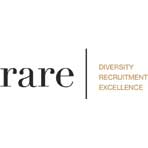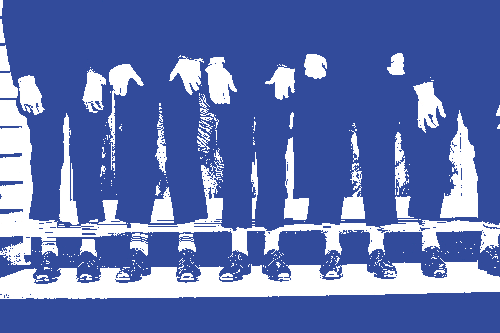
GC: Can you give me an idea of how and why you started Rare Recruitment?
Raphael Mokades (RM): I graduated from Oxford in 2001, and went on to do a business graduate programme, and through this I did a stint at Pearson in a diversity role. I persuaded them to keep me on, and so I became the diversity manager in the UK and US, dealing with recruitment, retention and promotion of senior women, LGBT people, that sort of thing. The thing I was good at, and interested in, was recruiting students. The one thing I understood from my time at Pearson is that they weren’t the only company looking for diverse candidates, and there was a significant lack of information available to them about how to attract diverse talent. I wanted to set something up to give them a better understanding and a more informed set of options. I wanted to find smart people from diverse backgrounds and give them really good advice.
GC: Did you find it was hard to gain traction in the recruitment market?
RM: No, it was extremely easy to gain traction because of where I was. I knew the candidates, I came from the same background, I had credibility within the corporate sector because of Pearson, and so people would take a meeting with me. Also our service was free, so I found it extremely easy to get candidates and recruiters. So gaining traction wasn’t a problem; delivering results was. It was hard because I soon learned that barriers to equality are not just the very obvious ones; if that was the case, there wouldn’t be a Rare and there wouldn’t be a problem with diversity. This is the reason that companies, rather than spend a small amount of money on others, instead spend a large amount of money on Rare, because there is a lot to it and it is complex and difficult. Delivering results has been much more challenging. I hadn’t understood the complexity, if I’m honest. I blundered into the market at a good time – 2005 was boom time, and we had lots of business from the finance sector, and there was lots of money floating around at the time.
GC: Were there things about Rare Recruitment that were different and new?
RM: Yes, no one had said ‘I will be candidate-led’, which is right for the kids that we work with. Rare worked across a broad range of industries and, in 2005, that was completely new. I think the fact that every single Rare candidate gets a one-on-one session is also very novel. That hasn’t been copied because it is an expensive model and time-intensive.
We recruit on an annual retainer for law firms; whether they hire nobody or 20 people, the cost doesn’t change. Seven or eight years ago, we worked on a fee-per-hire model and people stopped interviewing our candidates as frequently. We asked, ‘why are you not interviewing our candidates? They are good’. And they said, ‘because that’s the problem – they are very good, and we’re concerned that if we do interview, we will want to offer, and we can’t afford to’. This made me realise we had it wrong – if you set out to help people but you are actually hurting them, then you’ve got it wrong.
GC: What have been your key moments or milestones?
RM: In 2006, I made my first hire, who was my brother. By 2007, we were hiring people we weren’t related to, and that same year we were in two tiny offices in Hatton Garden. In 2009, we moved into bigger offices, and in 2011 we moved here. In 2015, we launched the Contextual Recruitment System (CRS). It took about ten years to get to about 40 clients. With CRS, since May, we have gained 25 clients already. I can see the software scales much quicker. If you look at the law, what we do is well geared towards magic circle firms, top silver circle, and elite US firms. That is a suitable model. It isn’t quite so suitable for in-house, legal apprenticeships, or regional firms; for those, the CRS software would be better.

RM: If you have a candidate who gets AAB at A Level, has no legal work experience, and is studying law at Queen Mary University of London, and you are a magic circle law firm, what do you know about that person? You know that AAB grades are okay, though not special, and that Queen Mary is part of the Russell Group but not at the top, and that the candidate hasn’t been proven in the industry. On that basis, given how much in demand the firm is, how many applicants there are – with many who have straight As, who have done some work experience, who may have been at Oxbridge – then the candidate isn’t likely to be called to interview because, while there is nothing wrong with them, there also isn’t enough right with him or her either.
But if you knew that the candidate had been at a school where the average was two Ds and an E, the candidate had outperformed the school by 92%, that he or she had come from a bottom 5% postcode, with corresponding low incomes, deprivation scales etc, and you knew that his or her parents had not been to university, you might start to see a different picture. Specifically, you might say that this person has outperformed remarkably, is clearly smart and resilient, and if that candidate was looking for a vacation scheme, then how would he or she have had the experience without the right exposure? If the candidate has applied, then that shows he or she is keen. And a university choice is not solely a reflection on your ability to get into the poshest or most prestigious places. You might have to go to a particular university because you need to live at home; for example, if you were a carer or you came from a tightknit family, or you couldn’t afford to live away from home. University choice isn’t always black and white. The Contextual Recruitment System takes into account things like free school meals, whether someone is also working [in addition to studying], social background – the stuff that you wouldn’t get from a standard CV. This information is fed into an algorithm that is completely integrated into the recruitment systems of our clients.
GC: What are the biggest benefits of diversity in hiring strategy?
RM: There are four benefits, broadly speaking. One is the market: for example, if you are selling a hair product for black women, you wouldn’t have only white males on the team. That approach is no good, because you have to understand the market. Talent is another: if you think talent is evenly distributed, and you don’t hire women, then you are missing out on 50% of the talent. Another benefit is reputational: it makes people feel good about the firm they work for, which is good for the company. It keeps people being productive and it makes people happy to procure from you, such as governments, clients, and companies. The other is the legal benefit, because you are much less likely to get sued by an aggrieved minority person if you can prove that their being aggrieved has nothing to do with their minority status.
I know someone who ran a law firm 20 years ago, who then went to South Africa to pitch, and he had no black people on the team at all, which he soon realised was a bad idea, considering the timing. That is an extreme example, but it illustrates the point. Big corporations and governments are on this and they are often the customers of the law firms.
GC: How do you avoid diversity becoming a box-ticking exercise?
RM: When our candidates make applications, they do so entirely on their own merits and, because we have no quota, companies actually fight over candidates. People have to get in on their own merit but if the system to hire them is broken they won’t get in. You need level playing fields, you have to make sure the process is fair, and you will get really good people. Is it labour, cost and time intensive? Yes, it is, but look at Clifford Chance. In the last three years it has become very diverse, and it has become normal there because the firm has invested in it. Admittedly, it is a billion-pound law firm, but if they can do it then others can. Clifford Chance has been the first in the legal sector to trial blind CVs, and they were the people who sponsored our research of contextual data.
GC: Where do in-house legal teams fit in?
RM: It is essential that firms have good diversity policies and practices. Lots of lawyers who qualify end up in-house, so the classic question is of management and progression. What is the plan? Groups drop out when they don’t have role models and progression plans. So it becomes incumbent on you, when it is time for appraisals and terminations, to ensure that diversity is fairly managed and not diminished with every promotion or restructure.
GC: What’s the next step on this journey?
RM: I think we live in an era of big data, and we are only beginning to scratch the surface of what data can do on this front. Once you have the data, you can really look at both the receiving end and the giving end, and all the interesting stuff which informs everything else you are doing. It is tremendously exciting.
